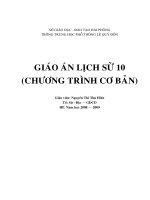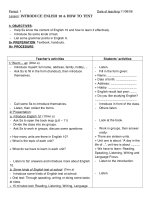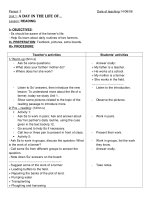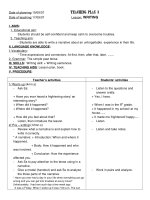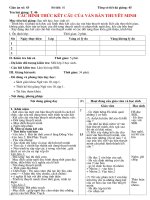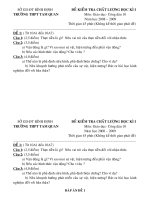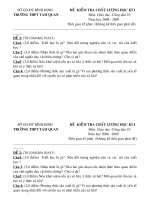Plan 10 HKI
Bạn đang xem bản rút gọn của tài liệu. Xem và tải ngay bản đầy đủ của tài liệu tại đây (458.72 KB, 83 trang )
SỞ GIÁO DỤC & ĐÀO TẠO ĐỒNG NAI
TRƯỜNG THPT BÌNH SƠN
GIÁO ÁN TIẾNG ANH 10
(CƠ BẢN)
Giáo viên: Hoàng Thị Quỳnh Trâm
Năm học 2010 – 2011
Week: 1
Period: 1
REVISION
I. Objectives:
- Ss remember some grammar points by doing some exercises.
II. Activities:
1. Testing old lesson:
- passed
2. New lesson:
Teacher’s and Student’s
activities
-T provides exercises
-Ss do it (25’)
-T corrects (24’)
Exercise 1:
1.went
2.have been
3.came
4. visited
5.play
6.to choose
7.to come
8. haven’t seen
9.have been – visited
10. had got
Exercise 2:
1.The sea was too rough for the
children to go swimming
2. The children aren’t old enough
to see horror films
3. Anne suggested going there by
bus
4. They always play badminton on
Tuesday
5. When we were having lunch,
there was a knock at the door.
III. Consolidation and homework:
Ss prepare Unit 1
Content
Exercise 1:
1.My friend ..................to the museum last weekend
(goes / went / had gone / have gone)
2. Thu & Lan .................close friends for years.
(are / were / had been / have been)
3. Our Singaporean friends ...................to visit our school last year.
(is coming / come / came / have come)
4. We .................Malaysia last summer.
(visited / were visiting / are visiting / have visited)
5. The students used to ..................play football in that stadium.
(played / play / playing / are playing)
6. Her parents want her .................some good books to read.
(to choose / choose / chose / chosing)
7. Would you like ..................and visit my country?
(come / coming / to come /came)
8. The children ...................their parents for a long time.
(didn’t see / haven’t seen / don’t see / haven’t see)
9. I and Kenny ....................pen pal since I .................Singapore.
(are-visit / were-visit / have been-visited / were-have visited)
10.Ba said he ....................some good marks last semester.
(gets / got / getting / had got)
Exercise 2:
1. The children couldn’t go swimming because the sea was very
rough.
The sea was too ...................................................................
2. The children are too young to see horror films.
The children aren’t ................................................................
3. Why not go there by bus?
Anne suggested .................................................................
4. Their game of badminton is always on Tuesday.
They ...................................................................................
5. In the middle of our lunch there was a knock at the door
When ..................................................................................
Week: 1
Period: 2
UNIT 1: A DAY IN THE LIFE OF... (Reading)
I. Objectives:
- Ss get to know a day in the life of a farmer in Viet Nam.
II. Activities:
1. Testing old lesson:
- passed
2. New lesson:
Teacher’s and Student’s activities
PRE-READING: 20’
-T asks ss to look at the picture in the
book and ask: “What is he doing?”
(working) Where? (in the field) What is
his job? (farmer/peasant)”
-T says: “Today we will learn about a
day in the life of a farmer”
-T presents new words.
-T writes the question: “Who are
talking?”
-T plays the disc. Ss listen
WHILE – READING: 20’
-Ss answer T’s question
Task 1:
-Ss read the instruction and translate it
-Ss do it
-T corrects
Task 2:
-Ss read and translate the instruction
-Ss do it
-T corrects
Task 3:
-Ss read and translate the instruction
-Ss do it
-T corrects
POST- READING: 4’
-Ss talk about a day of Mr Vy and Mrs
Tuyet, using task 3.
III. Consolidation and homework:
Ss prepare Speaking
Content
*New words:
-go off (v):
-take a rest = have a rest
-harrow (v):
-plough (v):
-pump ...into ... (v):
“Who are talking?” Mr Vy and Mrs Tuyet.
Task 1
1.c 2.c 3.a 4.a
Task 2:
1.a farmer
2.He gets up at 4:30. Then he goes down to the kitchen to boil
some water for his morning tea.
3.He ploughs and harrows his plot of land
4.They repair the banks of their plot of land. My Vy pumps
water into it while Mrs Tuyet does the transplating
Task 3:
+In the morning:
-4.30: Mr Vy gets up, makes and drinks tea, & has breakfast
-5.15: leaves home
-5.30: arrives in the field, ploughs and harrows
-7.45: takes a rest
-10.30: goes home
-11.30: has lunch with family
+In the afternoon:
-2.30: Mr Vy and Mrs Tuyet get to the field again, repair the
banks of the plot of land. He pumps water into it and she does
the transplanting.
-6.30: finish work
-7.00: have dinner
+ After dinner:
-watch TV, go to bed, sometimes visit neighbours an chat
with them
Week: 1
Period: 3
UNIT 1: A DAY IN THE LIFE OF... (Speaking)
I. Objectives:
- Ss ask and answer about lessons in a timetable and talk about a day in the life of a student.
II. Activities:
1. Testing old lesson:
- T asks 1 student to write some new words in the Reading, and answer some questions.
2. New lesson:
Teacher’s and Student’s activities
PRE-SPEAKING
-T says: “Today we will study speaking”
WHILE AND POST-SPEAKING
Task 1: 10’
-Ss read the timetable and the example. T
explain difficult words.
-Ss do it in pairs
-Some pairs speak before class
Task 2: 19’
-Ss look at the picture, T helps Ss with the
English words for the activities.
-In pairs, Ss talk about Quan’s activities,
using the picture
-Ss report back, T corrects
III. Consolidation and homework:
- Ss prepare Listening
Content
Task 1
-Information Technology = IT:
-Physical Education:
-Geography:
-Chemistry:
-Class meeting:
Examples:
A: What time does Quan have a Civic Education lesson on
Monday?
B: at 7:15 a.m.
A: What lesson does Quan have at 7.15 a.m. on Monday?
B: A Civic Education lesson
Task 2:
-go to the stadium / go to the football practice
-go home
a. He gets up at 2.00 p.m
b. He studies the lessons / reads books at 2.15
c. After that, he watches TV at 4.30 p.m.
d. He goes to the football stadium at 5.00 p.m
e. He plays football with friends at 5.15 p.m.
f. He goes back home at 6.30 p.m
g. He takes a shower at 6.45
h. He has dinner with family at 7.00 p.m
i. He does homework at 8.00 p.m
Week: 2
Period: 4
UNIT 1: A DAY IN THE LIFE OF... (Listening)
I. Objectives:
- Ss listen to a cyclo driver talking about his daily activities.
II. Activities:
1. Testing old lesson:
- T asks 1 student to write some new words in the Speaking and speak about their daily routines.
2. New lesson:
Teacher’s and Student’s activities
PRE-LISTENING
-T says: “Today we study listening”
Before you listen
-T ask ss the questions on page 16. Ss answer
individually
-T reads the words and give meaning; Ss repeat
WHILE-LISTENING
Task 1: 10’
-Ss read the instruction and translate it
-Ss look at the pictures and say the actions
-T plays the tape twice; Ss number the picture
-T corrects the task
Task 2: 9’
-T plays the tape again; Ss mark true or false
-T corrects it
Content
*New words:
-district (n)
-drop (v)
-routine (n)
-passengers (n)
-office (n)
-ride (v)
-pedal (v)
-park (v)
-purchase (v)
-food stall (n)
Task 1.
1.e 2.f 3.a 4.c 5.b
Task 2: 5’
1F 2.T 3.F 4.F
POST- LISTENING
- Ss use the words and the information in task 1,2
and talk about a day of Mr Lam
-T asks 1 student to speak if there is enough time
III. Consolidation and homework:
- Ss prepare Writing
6.d
5.F
6.F
Week: 2
Period: 5
UNIT 1: A DAY IN THE LIFE OF... (Writing)
I. Objectives:
- Ss write a narrative.
II. Activities:
1. Testing old lesson: 5’
- T asks 1 student to write some new words in the Listening and answer about Mr Lam, a cyclo driver
2. New lesson:
Teacher’s and Student’s activities
PRE-WRITING: 15’
-T says: “Today we learn how to
write a narrative”
-T asks ss the meaning of
“narrative”
Task 1:
-Ss read the narrative and find the
past simple verbs and the
connectors (time expressions)
-Ss do it; T corrects
-T asks: “What tense do we use to
write a narrative?” (past tenses)
-T repeat the form and use of past
simple, past perfect, past
continuous.
Task 2:
-Ss find the events, climax and
conclusion of the story.
-T corrects
WHILE- WRITING: 20’
Task 3:
-Ss write in 4 groups
POST- WRITING: 4’
-T asks groups to write on the
board
-T corrects mistakes
Content
*New words:
-native teachers (n)
-per
-free (adj)
Task 1:
+Verbs in past tense: stared, was, arrived. Got, took off, began,
thought, were, seemed, realised, were, screamed, felt, announced,
was, landed
+Connectors (time expressions): When, at first, on that day, Then,
just when, a few minutes later
Telling a narrative:
*Past Simple: S+ V2/-ed ; S + didn’t V1; Did + S + V1? (short
action)
*Past Continuous: S + was/were V-ing (long action, happening)
*Past Perfect: S + had V3/V-ed (before a time/ another action)
Task 2:
-events: got on the plane, plane took off, hostesses were just
beginning to serve lunch when the plane began to shake, plane
seemed to deep, people screamed in panic
-climax: we thought we had only minutes to live
-conclusion: pilot announced that everything was all right, we
landed safely.
Task 3:
Last year I spent my summer holidays at a seaside town. The hotel
was modern and comfortable. I had a wonderful holiday until the
fire.
It was (a) Saturday evening and everybody was in the discotheque
on the ground floor. It was crowded with people. They were
dancing and singing happily. Suddenly we felt smoke. Then black
smoke began to fill the room. Everbody started to scream in panic.
People ran towards the fire exits. One door was blocked. Many
people began to cough and choke.
Then just as we though we had only minutes to live, the fire
brigade arrived. Firemen fought their way into the room and soon
everyone was safely out of the building. Luckily, nobody was
seriously hurt. It was the most frightening experience in my life.
III. Consolidation and homework: 1’
- Ss prepare Language Focus
Week: 2
Period: 6
UNIT 1: A DAY IN THE LIFE OF... (Language Focus)
I. Objectives:
- Ss can pronounce / ɪ/ and / i:/ correctly
-Ss review present simple, the position of adverb of frequency, and simple past
II. Activities:
1. Testing old lesson: 5’
- T asks 1 student to do give the correct tense: 1. It (be) .................a nice Sunday morning. We (go) for a
walk in the park. In the park, the people (do) ..................morning exercise and the birds
(sing)................... We (sit) ......................on a banch and (watch) ..................life.
2. New lesson:
Teacher’s and Student’s activities
Pronunciation
-T pronounces the vowels, Ss repeat
-T asks Ss to read the sentences and
corrects
Grammar
1.The simple present
-T gives examples and Ss give the form
and use of the tense
-Ss do Exercises 1,2
-T corrects
2. The past simple
-T gives examples and Ss give the form
and use of the tense
-Ss do Exercise 3
-T corrects
Content
Pronunciation
/ ɪ /: hit, kick, fit, cinema
/ i:/: heat, read, eat
1.The simple present
Ex: I’m a student. I usually get up at 5.00. I don’t get up at
5.00 on Sundays
Ex: She’s a farmer. She usually gets up at 4.00. She doesn’t
get up at 4.00 on Sundays
*thói quen, sự thật
*To be: S + am/is/are
*Ordinary verbs: S + V1/V-s/es ; S + don’t/doesn’t +V1 ;
Do/Does + S?
Ex: You are never late.
*Always, usually, often, sometimes, seldom, never: after be,
before ordinary verbs
Exercise 1:
1.is
2.fish 3.worry
4.are
5.catch 6.am
7.catch
8.go
9.give up
10.say 11.realize 12.am
Exercise 2:
He always gets up early
She is never late for school
Lan normally practises speaking English
Thao is always a hard-working student
2. The past simple
Ex: Yesterday I arrived late, but she came early.
Form: S + V2/V-ed
Neagtive: S + didn’t + V1
Question: Did + S + V1?
Meaning: past action, with definite time: “yesterday, last..., in
2000, ....ago”
Exercise 3:
1.was done 2. cooked 3.were 4.smelt 5.told 6.sang
7.began 8.felt
9.put out 10. Crept 11.slept 12.woke
13.was 14.leapt 15.hurried 16. Found 17.wound
18. flowed
III. Consolidation and homework: 1’
- Ss prepare Unit 2
Name: .......................................
Test 15’ _ Unit 1
Class: 10A......
Grade 10
*Points: vocabulary in unit 1, present simple with adverbs, past simple, past contiuous, past perfect
1.The alarm goes .......................at 4:00 a.m.
a. off
b. of
c. out
d.in
2.When I’m tired, I usually take a .......................
a. red
b. rest
c. bread
d. read
c. to learn
d. to repair
3.It takes me 30 minutes to get ready.
a. to go
b. to prepare
4. What ................... do you like best at school? I like Literature best.
a. song
b. object
c. timetable
d. subject
5. I continue to work until 11:15.
a. quarter past eleven
b. quarter after eleven
c. fifteen past eleven
d. all are correct
6. Lan is late for school. (never)
a. Lan is late for school never
b. Lan never is late for school
c. Lan is never late for school
d. Never Lan is late for school
7. Thảo practises speaking English. (usually)
a. Thảo practises uasually speaking English
b. Thảo practises speaking usually English
c. Thảo usually practises speaking English
d. None is correct
8. During / I /my break / drink / with my fellow peasants / tea /often
a. During my break I often drink tea with my fellow peasants
b. During my break I drink often tea with my fellow peasants
c. During tea I often drink my break with my fellow peasants
d. During I often drink my tea break with my fellow peasants
9. We chat about our life.
a. talk in a friendly way
b. learn
c. discuss
10. Last year / I / spend / summer holidays / a seaside town.
a. Last year I spend my summer holidays at a seaside town
b. Last year I spent my summer holidays at a seaside town
c. Last year I spended my summer holidays at a seaside town
d. Last year I spent my summer holidays a seaside town
11. Swimming (be) .........................my favorite sport because it is good for my health
a. be
b. is
c. are
d. was
d. argue
12. I (not know) ..........................why it doesn’t work.
a. didn’t know
b. don’t know
c. doesn’t know
d. am not know
13. Nancy (arrive) .............................half an hour early yesterday.
a. arrive
b. arrives
c. arrived
d. to arrive
14. She (work) ...........................very hard when she was a student.
a. works
b. work
c. working
d. worked
15. The World War II (begin) .........................in 1939.
a. beginning
b. begins
c. begun
d. began
16. I (not come) ..............................to class last week.
a. didn’t come
b. am not come
c. wasn’t come
d. don’t come
17. Why (you be) .........................angry with me yesterday?
a. you were
b. were you
c. are you
d. you are
18. My mother (always / do) .........................morning exercise everyday.
a. always do
b. is always do
c. always does
d. does always
19. I (eat) ..............................dinner when she came, so I invited her to eat with me.
a. ate
b. eats
c. was eating
d. eating
20. When I (do) ............................my homework, I went for a walk.
a. did
b. had did
c. have done
d. had done
Key:
1
2
3
4
5
6
7
8
9
10
11
12
13
14
15
16
17
18
19
20
A
B
B
D
D
C
C
A
A
B
B
B
C
D
D
A
B
C
C
D
Week: 3
Period: 7
UNIT 2: SCHOOL TALKS (Reading)
I. Objectives:
- Ss learn talks about school.
II. Activities:
1. Testing old lesson: 5’
- Ss do the following exercise: 1. I don’t go to bed late. (usually)
2. She (be) ...............at home on Sundays. But last week she (go) ............. to Ho Chi Minh City.
*Key: 1. I don’t usually go to bed late. 2. Is / went
2. New lesson:
Teacher’s and Student’s activities
PRE-READING: 20’
-T asks ss to read the topics in the book and asks:
“When you meet your friend, what do you talk about?”
Ss answer individually.
-T says: “Today we will learn about what people say
about school”
-T presents new words.
-T writes the question: “Who are talking?”
-T plays the disc. Ss listen
WHILE – READING: 20’
-Ss answer T’s question
-T ask ss to do task 1
Task 1:
-Ss read the instruction and translate it
-Ss repeat the words in the box after teacher
-Ss do it in 3’
-T corrects
Task 2:
-Ss read and translate the instruction
-Ss do it in pairs
-T corrects
Task 3:
-Ss read and translate the instruction
-T explains the word “profession”
-Ss answer the questions in pairs
-T corrects
POST- READING: 4’
-In groups, Ss ask and answer: “What subjects do you
like best? Why? What do you like or dislike at school?
What do you worry about at school?”
-Ss report back.
III. Consolidation and homework:
Ss prepare Speaking
Content
*New words:
-and so on:
-an international language
-worry about (v):
-far from school:
-narrrow streets:
-much traffic:
“Who are talking?” Phong, Ms Tuyet and
Phong’s father.
Task 1
1.enjoy 2.traffic
3.worry 4.crowded
5.language
Task 2:
-has to get up early: Phong
-lives far from school: Phong
-loves working with children: Miss Phuong
-rides a bike to school everyday: Phong
-studies at a high school: Phong
-teaches English at a high school: Miss Phuong
-worries about someone else’s safety: Mr
Phong
Task 3:
-profession = job
1.He studies at Chu Văn An High School
2.He studies Maths, Physics, Chemistry,
Biology, Literature, History, Geography, etc.
3. Becaue English is an international language.
4. Teaching is hard work but she loves it
because she loves working with children.
5. Because his son has to ride his bike in
narrow and crowded street.
Week: 3
Period: 8
UNIT 2: SCHOOL TALKS (Speaking)
I. Objectives:
- Ss learn to start and end a conversation, and give advice people
II. Activities:
1. Testing old lesson: 5’
- T asks 1 student to write some new words in the Reading, and answer some questions.
2. New lesson:
Teacher’s and Student’s activities
PRE-SPEAKING
-T says: “Today we will study speaking”
WHILE AND POST-SPEAKING
Task 1: 5’
-Ss read the expressions and put them in
the right column: starting or closing a
conversation
-Ss do it in pairs
-Ss give answer, T corrects
Task 2: 10’
-Ss rearrange the sentences in the right
order
-T corrects
-Ss practice the conversation in pairs
-Ss speak before class
Task 3: 10’
-T helps Ss with the language in the box
-Ss complete the conversation individually
-T corrects
-Ss practice the conversation in pairs
-Ss speak before class
Task 4: 14’
-Ss read the instruction
-T models a conversation by herself.
-Ss speak in pairs
-Ss speak before class
Content
Task 1
Starting a conversation
*Good morning/Hi
*How’s everything at
school?
*Hello. How are you?
*Hello. What are you
doing?
*Hi. How is school?
Closing a conversation
*Sorry, I’ve got to go.
Talk to you later.
*Well, it’s been nice
meeting you.
*Goodbye. See you later.
*Great. I’ll see you
tomorrow.
*Catch you later.
Task 2:
1.D.Hi, Minh. Did you have a nice weekend?
2.F.Hello, Quan. Yes, I did. It’s great.
3. B.What did you do?
4. H.I went to Lan’s birthday party. The food was good
and the people were interesting. What did you do, Quân?
5.E.Oh, I stayed at home and did my homework. Nothing
speacial.
6.C. Where are you going now?
7.G. I’m going to the library to borrow some books. Sorry,
I’ve got to go. Talk to you later.
8.A. Bye. See you later.
Task 3:
-What’s the matter with you?
-I am/feel +adj.
-have (got) a headache/ a cold / backache / toothache
-should go home/have a rest/ go to the doctor/ take some
medicine.
A: Hello, Hoa. You don’t look very happy. What’s the
matter with you?
B: Hi Nam. I feel sick. I’ve got a headache.
A: Sorry to hear that. You should go home and have a rest.
B: Yes, that’s a great idea. Goodbye, Nam.
A: See you later.
Task 4:
-Hi, Nam. Did you watch the football match on HTV9 last
night?
-Hi, Thành. No, I didn’t. I had to do my homework. How
was it?
-Fantastic. Long An played really well. An Giang played
badly.
-What was the score?
-Long An won by 4 to nil.
-That was bad. An Giang is a good team.
-Where are you going?
-I’m going to the bookshop. I want to buy some books.
Oh, I’ve got to go. Talk to you later.
-Ok, see you.
III. Consolidation and homework: 1’
- Ss prepare Listening
Week: 3
Period: 9
UNIT 2: SCHOOL TALKS (Listening)
I. Objectives:
- Ss listen to conversations in class, at a party, at the beach and in a hotel.
II. Activities:
1. Testing old lesson: 5’
- T asks 1 student to write some new words in the Speaking and make a conversation with T.
2. New lesson:
Teacher’s and Student’s activities
PRE-LISTENING
-T says: “Today we study listening”
Before you listen: 5’
-T reads the questions. Ss repeat
-Ss match the questions and answers
-T corrects.
-Ss practice them in pairs
WHILE-LISTENING
Task 1: 10’
-Ss read the instruction and translate it
-Ss look at the pictures. T asks: “Where are the
people?” Ss answer
-T plays the tape twice; Ss number the picture
-T corrects the task
Task 2: 15’
-Ss read the questions in 2 minutes
-T plays the tape again; Ss answer
-T corrects it
Task 3: 5’
-Ss read the conversation in 1 minutes
-T plays the tape again; Ss fill in the blanks
-T corrects it
POST- LISTENING: 4
- Ss make a similar conversation about
school/class
-Ss speak before class
III. Consolidation and homework: 1’
- Ss prepare Writing
Content
Before you listen
1.c 2.e 3.a 4.b 5.d
1.What subjects are you taking this semester? I’m
taking English.
2.How do you like the class? I really like it (it is
great/good/not bad/ok/ terrible)
3. Are you enjoying the party? Yes, I am
4. How long are you staying? For a month
5. Would you like to have a drink? Sure
Task 1.
1.b 2.c 3.d 4.a
Task 2:
1.English
2.Miss Lan Phương’s class
3. at a party
4. for a week
5. No, she doesn’t
Task 3:
1.it here
2.very nice
3. big
4. comfortable
5. travelling
6. No
7. alone
8. for a drink
Week: 4
Period: 10
UNIT 2: SCHOOL TALKS (Writing)
I. Objectives:
- Ss learn to fill in a form.
II. Activities:
1. Testing old lesson: 5’
- T asks 2 students to ask and answer about class
2. New lesson:
Teacher’s and Student’s activities
PRE-WRITING: 15’
-T says: “Today we learn how to
fill in a form”
-T teaches the meaning of “form”
Task 1:
-T asks ss “When do you fill in a
form?”
“What sort of information do we
give when filling in a form?”
Task 2:
-T teaches the meaning of the
words in column A.
-Ss match A with the correspondent
question in B
-T corrects
WHILE- WRITING: 20’
Task 3:
-Ss read the instruction
-T explains the new words
-Ss fill
Task 4:
-Ss read the instruction
-T explains the new word
-Ss fill
POST- WRITING: 4’
-T asks a student to write on the
board
-T corrects mistakes
Content
Filling in a form
Task 1:
1. When we enroll in a school/apply for a job
2. Name, address, date of birth, place of birth, etc.
Task 2:
-first name:
-surname:
-date of birth = birthday
-place of birth:
-present address:
-marital status:
-occupation = job = profession
1.d 2.f 3.e 4.g 5.b 6.c 7.a
Task 3:
-block capital = capital
-sign your name:
-applicable (adj)
-male (n, adj) ≠ female
Task 4:
-nationality (n)
Surname HOANG
First name
TRAM
Date of birth
18 OCTOBER, 1984
Nationality
VIET NAM
Languages
VIETNAMESE
Address in your country
AN PHUOC VILLAGE, LONG
THANH DISTRICT, DONG NAI PROVINCE, VIET NAM
Occupation
TEACHER
Reason for learning English TEACHING
How many hours a day do you want to stay at the school? 4
What date do you want to start? 20 SEPTEMBER
III. Consolidation and homework: 1’
- Ss prepare Language Focus
Week: 4
Period: 11
UNIT 2: SCHOOL TALKS (Language Focus)
I. Objectives:
- Ss can pronounce / ʌ/and / a:/ correctly
-Ss make Wh-questions, and learn Gerund and To-infinitive
II. Activities:
1. Testing old lesson: 5’
- T asks 1 student to write 5 words in the Writing and answer questions about themselves
2. New lesson:
Teacher’s and Student’s activities
Pronunciation
-T pronounces the vowels, Ss repeat
-T asks Ss to read the sentences and
corrects
Grammar
1.Wh-questions
-T asks Ss questions and Ss identify
Wh-words and its position
-Ss do Exercise 1
-T corrects
2. Gerund and To-infinitive
-T gives examples and Ss draw the
use
-Ss do Exercises 2,3
-T corrects
Content
Pronunciation
/ʌ /: study, subject, cousin, love, wonderful
/ a:/: far, father, marvellous, target, guitar
1. Wh-questions
Vd: What subjects do you study on Monday?
How do you love Vietnam?
*Wh-words: “What, who, where, when, how, why, which,
whose” are at the beginning of the question.
Exercise 1:
1.When did you arrive?
2.How long did you stay?
3.Who did you come with?
4.Where do you live?
5. Why do you like it?
6.What time is it?
7. How many children do they have?
2. Gerund and To-infinitive
Gerund (V-ing)
*Smoking is bad for health
(as subject)
*My hobby is doing
Vovinam (as object of “be”)
*I like swimming
(as object of some verbs:
like, hate, love, enjoy,
dislike, consider, stop, avoid,
try, miss, mind, suggest...)
*I’m interested in learning
(as object of prepositions: in,
on, at, with, about, of,
from...)
To-infinitive
*To smoke is bad for health
(as subject)
*My hobby is doing
Vovinam (as object of “be”)
*I like to swim
(as object of some verbs: like,
hate, love, hope, agree,
decide, want, need, expect,
seem, offer, threaten...)
*He came this morning to
return the book. (purpose)
Exercise 2:
1.expect to hear
2.avoid going
3.have trouble remembering
4.practice doing
5.stop worrying
6.try to pay
7. plan to go
8. consider visiting
9. miss seeing
10. enjoy hearing
Exercise 3:
1.decide to go
2.don’t mind waiting
3.suggest having
4.hope to find
5. go on living = keep living
6. stop making noise
7. threaten to call
8. agree to lend
9. stop talking
10. forget to post
III. Consolidation and homework: 1’
- Ss prepare Unit 3
Week: 4
Period: 12
UNIT 3: PEOPLE’S BACKGROUND (Reading)
I. Objectives:
- Ss learn Marie Curie’s background.
II. Activities:
1. Testing old lesson:
- T asks Ss to give the right form of the verbs: 1.I don’t want ...................(listen) more.
2.Keep on ...................(do) it.
3. She practises ..................(sing) everyday
4. I’ve decided ..................(learn) Chinese
*Key: 1.to listen 2.doing 3.singing 4.to learn
2. New lesson:
Teacher’s and Student’s activities
Content
Marie Curie discovered: a)radium
PRE-READING: 20’
Who won the Nobel Prize in Chemistry? a)Marie Curie
Warm-up
*Quiz: 2 groups. T reads, Ss choose the answer quickly.
1.Marie Curie discovered: a)radium b)gravity
c)theory of evolution
2. Who won the Nobel Prize in Chemistry? a)Marie
Curie b)Newton c)Einstein
3.Warsaw is the capital of : a) Poland b)England
c)Thailand
4. Sorbornne is the name of : a) a building b) a city
c) a country
-T says: “Today we will learn about Marie Curie, a
great scientist”
-Ss answer the questions in Before you read
-T presents new words.
-T plays the disc. Ss listen
WHILE – READING: 20’
Task 1:
-Ss read the instruction and translate it
-Ss match A with the meaning in B
-T corrects
Task 2:
-Ss read the passage again and mark true or false
-T corrects
Task 3:
-Ss answer the question in pairs
-T corrects
POST- READING: 4’
-Ss use the adjectives to find the evidence in the
passage and then talk in groups.
Warsaw is the capital of : a) Poland
Sorbornne is the name of : a) a building in the
University of Paris
*New words:
-general education
-briliant (adj)
-mature (adj)
-harbour a dream (v):
-tutor(n):
-realise a dream (v)
-a degree with flying colors = an excellent degree
-determine (v) = find out
-atomic weight (n)
-ease suffering (v)
-humanitarian = humane (adj)
Task 1
1.c 2.e 3.a 4.d 5.b
Task 2:
1.T 2.F 3.T 4.F 5.T
Task 3:
1.She was born in Warsaw, November 7, 1867
2. She was a brilliant and mature student
3. To earn money for a study tour abroad
4. for determining the atomic weight of radium
5. No, it wasn’t. Her real joy was to eas human
suffering
After you read:
-strong-willed: she harboured the dream of
becoming a scientist, which was impossible for a
woman at that time. She also worked as a tutor to
save money, so her studies were interrupted.
-ambitious: After earning a degree in Physics, she
continued to take another in Maths
-hard-working: In spite of her diffifult living
conditions, she worked extremely hard.
-intelligent: she was brilliant. She was awarded a
Nobel Prize for determining the atomic weight of
radium.
-humane: Her real joy was “easing human
suffering”. The founding of the Radium Institute in
1914 made her humanitarian wish come true.
III. Consolidation and homework:
Ss prepare Speaking
Week: 5
Period: 13
UNIT 3: PEOPLE’S BACKGROUND (Speaking)
I. Objectives:
- Ss learn to ask and answer about a person’s background and talk about a person’s background.
II. Activities:
1. Testing old lesson: 5’
- T asks 1 student to write some new words in the Reading, and answer some questions.
2. New lesson:
Teacher’s and Student’s activities
PRE-SPEAKING
-T shows a picture of MC Quỳnh hương,
and asks: “Who is she?(MC Quỳnh hương)
Have you ever watched a talk show hosted
by Quỳnh Hương? (Yes)”
“What does she usually talk
about before interviewing a guest? (the
guest’s background)
-T says: “Today we will learn to ask and
answer about a person’s background”
Task 1: 10’
-Ss work in pairs and decide which to tell
about a person’s background, then think of
some questions to ask.
-T corrects
Task 2: 19’
-Ss read the instruction
-T helps Ss with the questions
WHILE AND POST-SPEAKING
Task 2:
-Ss work in pairs, take turns to interview
their partner
Task 3: 10’
-Ss read the instruction
-T models
-Ss work in groups to talk about their
partner’s background
-Ss report to classs
III. Consolidation and homework:
- Ss prepare Listening
Content
Task 1
Family, education, experience
Task 2:
*Hello, can I ask you some questions? (of course)
*What’s your name? (I’m...)
* Where and when were you born?(I was born in..., on...)
*Where do you live? (I live in...)
*How many people are their in your family? (There are...)
*What do they do? (My father is a...)
*Which primary school / secondary school did you go to?
(I went to...)
*How are the lessons and homework? (They are ok / so
much)
*Which subject do you like best? (I like ....best)
*Do you have any experience in learning English?(I learn
the lessons carefully, do exercises and then practise the
language)
*Thank you.
Task 3:
I interviewed Hoa. She was born in Dong Nai, on
November 8, 1995. She lives in Binh Son. There are 4
people in her family. Her parents are rubber workers. Her
brother is a student in Binh Son Secondary school. She
went to Bình Sơn primary and secondary school. Her
schoolwork is ok. The lessons are not difficult and
homework is not much. She likes English best. She learns
the lessons carefully, do exercises and then practise the
language with a friend. That’s all about my interview.
Week: 5
Period: 14
UNIT 3: PEOPLE’S BACKGROUND (Listening)
I. Objectives:
- Ss listen to people’s background and do the tasks.
II. Activities:
1. Testing old lesson:
- T asks 1 student to speak about a friend’s background.
2. New lesson:
Teacher’s and Student’s activities
PRE-LISTENING
Before you listen
-Ss look at the small picture in her book
-Asks “what’s her job?” (a gymnast, a champion)
-T ask ss the questions on page 16. Ss answer
individually
-Says: “You will listen to an interview between
Bob - a journalist and Sally – an Olympic
champion”
-T reads the words and give meaning; Ss repeat
WHILE-LISTENING
Task 1: 10’
-Ss listen 2 times and mark true or false
-T corrects the task
Task 2: 9’
-T plays the tape again; Ss fill
-T corrects it
POST- LISTENING
- Ss look at Task 1,2 to ask and answer questions
about Sally after T’s modeling.
-Ss speak loud to class
III. Consolidation and homework:
- Ss prepare Writing
Content
*New words:
- gymnast (n)
- champion (n)
-Olympic champion
-teacher’s diploma
-love story
-romantic (adj)
Task 1.
1.T 2.T 3.F 4.T 5.F
Task 2: 5’
1.a general eduation
2.lives – family
3.different – swimming
4.love stories
5.teacher’s diploma
POST- LISTENING
1.When did Sally join the Star Sport Cub? (in
1995)
2. How many people are there in her family? (5)
3. Has she got much free time? (No, she hasn’t)
4. What does she like besides sports? (reading)
5. What does she want to be? (a sports teacher)
Week: 5
Period: 15
UNIT 3: PEOPLE’S BACKGROUND (Writing)
I. Objectives:
- Ss write about people’s background.
II. Activities:
1. Testing old lesson: 5’
- T asks 1 student to write 5 new words in the Listening and answer Sally, an Olympic champion
2. New lesson:
III. Consolidation and homework: 1’
- Ss prepare Language Focus
Week: 6
Period: 16
UNIT 3: PEOPLE’S BACKGROUND (Language Focus)
I. Objectives:
- Ss can pronounce / e/ and / æ/ correctly
-Ss study The Past Perfect; and review The Past Simple in the use with The past perfect
II. Activities:
1. Testing old lesson: 5’
- T asks 1 student to write 5 words in the Writing and answer questions about themselves
2. New lesson:
Teacher’s and Student’s activities
Pronunciation
-T pronounces the vowels, Ss repeat
-T asks Ss to read the sentences and
corrects
Grammar
1.The past perfect
-T gives examples. Ss draw the form
and meaning.
-Ss do Exercise 1
-T corrects
2. The past perfect vs. The simple
past
-T gives examples and Ss draw the
use
-Ss do Exercises 2
-T corrects
Content
Pronunciation
/ e /: men, bed, pen, send, met, said
/ æ /: man, bad, pan, sand, mat, sad
1.The past perfect
Ex: By the time I arrived, the last bus had gone, so I had to
come back.
Ex: “Why was she angry with him?” “Because he had
disobeyed her.”
Ex: “Why didn’t she eat with us?” “Because she had just eaten
breakfast.”
Form: S + had V3/V-ed
S + had not V3/V-ed
had not = hadn’t
Had + S +V3/V-ed?
Meaning: -an action before a time/ another action in the past
-past of Present Perfect (time: just, before, already,
yet, for, since)
Exercise 1:
1.had broken
2.had done
3.had met
4.hadn’t turned off
5. had ever seen 6.had been dry
7. had left
8. had moved
9. hadn’t seen
10. had broken in
2. The past perfect vs. The simple past
Ex: The race had just finished when they arrived.
Trước
Sau (V2/V-ed)
Exercise 2:
1.had just finished - came
2.had seldom travelled - went
3.went – had already taken
4.did you manage – had he gone - got
5.had just got – phoned – had been
III. Consolidation and homework: 1’
Ss do exercise 3 at home and prepare Test Yourself A
Week: 6
Period: 17
TEST YOURSELF A
I. Objectives:
- Ss review the points in units 1,2,3 to prepare for the 45-minute test
II. Activities:
1. Testing old lesson: 5’
- T asks 1 student to do exercise 3 in unit 3, Language Focus. T corrects: Line 1: had; line 2: had; line 5:
had ; line 7: had; line 8: already went →had already gone
2. New lesson:
Teacher’s and Student’s activities
I.Listening
-Ss read through the task. T gives
new words
-T plays the disc 2 times. Ss fill. T
corrects
II.Reading
-T gives new words
-Ss read the phrases in the box and
fill the passage
III.Grammar
-Ss gives the correct form of the
verbs.
-T corrects
IV.Writing
-Ss read the letter
-T asks ss to write the reply at home
Content
I.Listening
*New words:
-Martin Luther King: người đấu tranh cho quyền của người da
đen ở Mỹ
-Atlanta, Georgia: thành phố Atlanta, tiểu bang Georgia ở Mỹ
-minister: (n) mục sư
-Baptist Church: nhà thờ tin lành rửa tội bằng cách dìm mình
xuống nước
-speech: (n) bài diễn văn
-Lincoln Memorial: Đài tưởng niệm cố tổng thống Lincoln
-Memphis, Tennessee: thành phố Memphis, bang Tennessee ở
Mỹ
1/ 15 Jan 1929
2/ in 1951
3/ for 4 years
4/ he met
5/ they got married
6/ a minister at a
7/ the black freedom movement
8/ heard his speech
9/ in 1964
10/ 4 April, 1968
II.Reading
-chairman: (n) chủ tịch
1.F
2.C 3.A 4.D
5.B
III.Grammar
1.to apply
2.am 3. Attended
7.reading
8.know 9.am able
III. Consolidation and homework: 1’
-Homework: Writing
-Ss review units 1, 2, 3
4.passed
5.got
10.hearing
6.can

